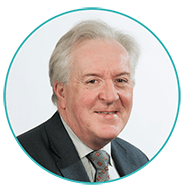The future of surgery

07 Dec 2018
Professor Derek Alderson, President of the Royal College of Surgeons
In the early 1990s, a College Commission on the ‘Provision of Surgical Services’ produced a document entitled 'Tomorrow’s Surgeon'. It outlined views about the nature of surgical practice in the 21st century and the ways in which the surgical community would have to adapt. The authors were, of course, cautious about venturing too far into the realm of surgical science fiction, acknowledging Machiavelli regarding the difficulties of predicting change and John Donne’s aphorism on the problem of bringing change about: ‘The despotism of custom is everywhere the obstacle to change’.
It’s interesting that they predicted and successfully introduced greater specialisation and centralisation of some services, along with an understanding that surgical practice would be increasingly influenced by technological developments. They envisaged a wider role for transplantation on the basis of significant advances in immunological knowledge, greater use of microvascular techniques, wider use of endoscopic approaches for therapy rather than diagnosis, along with more medical lasers, stapling devices, catheters, stents, tissue adhesives and implantable prostheses.
In passing, they discussed the impact of the microchip, foetal surgery, robotics, digital imaging, computer-assisted diagnosis and genomics, the latter under the interesting heading 'the new genetics'.
So what’s new?
Today’s Commission does not attempt to look too far ahead. If we have learned anything in the last 30 years, it’s that we are exposed to new knowledge and its practical applications more rapidly than ever. Technologies that move surgery away from complex treatments of advanced disease to lesser interventions for earlier stages of disease or even for prevention, mean that we need to train a workforce capable of delivering these types of interventions. At the same time, each of these individuals must commit to training the next generation and have the critical analytic skills to distinguish between a genuine advance and fashion. As we become increasingly reliant on a multi-disciplinary and multi-professional team to deliver care, the surgeon will almost certainly be expected to offer leadership.
While the Commission has focused on developments relevant to our NHS, we must not forget the consideration of surgical disease as a global health problem. Wide disparity in the provision of surgical services especially between high- and low-income countries is a problem that cannot be ignored. Widening inequalities in the provision of surgery both between and within countries could result in wealthier and better-informed individuals benefiting at the expense of others. Ethical dilemmas related to xenotransplants, the use of stem cells and gene editing techniques may influence the speed of change and while modern information technology systems should simplify and speed up many areas of activity within surgery, the rise of cyber-crime and the opportunity to manipulate and misuse data should not be overlooked.
Despite all these challenges, the present Commission offers a bright and exciting future for surgery. The evolution of specialisation must occur but perhaps the speed at which this occurs will prove to be one of the least predictable developments. What seems certain is that the modern surgeon will not only have to develop appropriate clinical skills, but can expect to be an educator, researcher, and leader of a multi-disciplinary and multi-professional team.
Now that’s not what the Commission 30 years ago predicted.

